When he was elected king of Poland, he was already 42 years old. He was our first monarch not to be able to write "prince" or "king" in the father column. He had to fight for everything he owned. Even if it involved beheading enemies and cutting the noses of hundreds of soldiers.
Stefan Batory was born in 1533 as the youngest son of the Transylvanian voivode. He quickly became an orphan. When he was one, he lost his father; his mother died when he was 14 years old. As a child, he found himself at the court of Pál Várday, the primate of Hungary, and became his squire.
From squire to…
Once upon a time, young Stefan accompanied the hierarchy on a trip to Vienna. There, Várday introduced him to Ferdinand Habsburg, King of Bohemia and Hungary. He presented the little helper with the words: Lord, here is a child who wishes to be treated like a man.
Stefan changed the primate's court into a royal one. He quickly became Ferdinand's assistant during the hunt. Hunting has become a hobby, a passion, and finally Batory's addiction. Later, as the king of Poland, he even hunted during military expeditions!
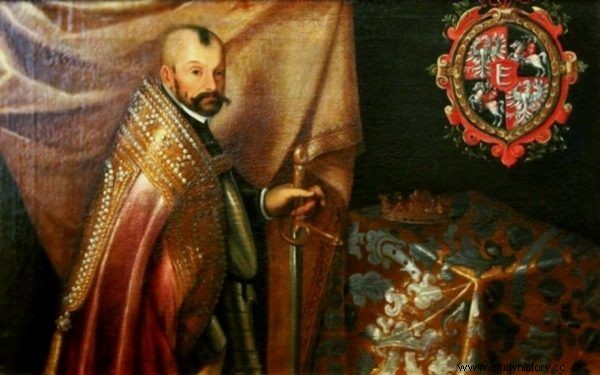
Batory retained his passion for hunting until the end of his life, even as the king of Poland. In the painting we can see him in a coronation garment.
At the age of 16, the future Polish monarch left for Italy in the retinue of his royal daughter Katarzyna. The Habsburgian woman married the Duke of Mantua there (and 4 years later, as a young widow, she became the wife of Sigismund Augustus). Batory visited Italy and improved his knowledge of Italian. Many studies report that he enrolled at the University of Padua at that time and studied for several months. What are the studies - King Stanisław August Poniatowski founded in this Italian city a monument to Stefan Batory as a graduate of the local university!
Meanwhile, the truth is that the future Polish king did not study in Padua at all . The matter was only explained a few years ago by György Gömöry, a literary scholar from the University of Cambridge. It is possible that the source of the mistake was the fact that another Stefan Batory, the king's nephew, was studying at the famous university.
King stingy, Stefan changes political option
In 1550, seventeen-year-old Stefan definitively left the court of Ferdinand Habsburg. He returned to his homeland and began his life as a soldier. At that time, Transylvania no longer recognized the authority of its former superior, the Hungarian king. The underage prince, Jan Zygmunt Zapolya, who ruled there, was dependent on the Turks.
Hungarian magnates fought between the Habsburgs and Zapolya. It was similar with Batory. First, he fought in the pro-Habsburg units. Despite his devotion, when he was taken prisoner, King Ferdinand spared the money to buy out the young soldier. After regaining his freedom, Stefan changed front.
Commander of Romanian fortresses
It was not only the future Polish monarch who turned away from the Habsburgs. When Izabela Jagiellonka, the mother of Jan Zygmunt Zapolya, returned to Transylvania in 1556, the local magnates sprinkled ashes on their heads. They related how much they regret having stood on Ferdinand's side earlier. On the occasion of Izabela's arrival, 23-year-old Batory gave a welcome speech in impeccable Latin. He did not yet know that two decades later he would marry her younger sister, Anna Jagiellonka , and he will sit on the Polish throne!
From then on, Batory belonged to the faithful supporters of Jan Zygmunt Zapolya. He also received important military tasks. In 1557 he became the commander of the Szatmár fortress (today's Romanian Satu Mare). Two years later he was transferred to Varadyna (today's Romanian Oradea).
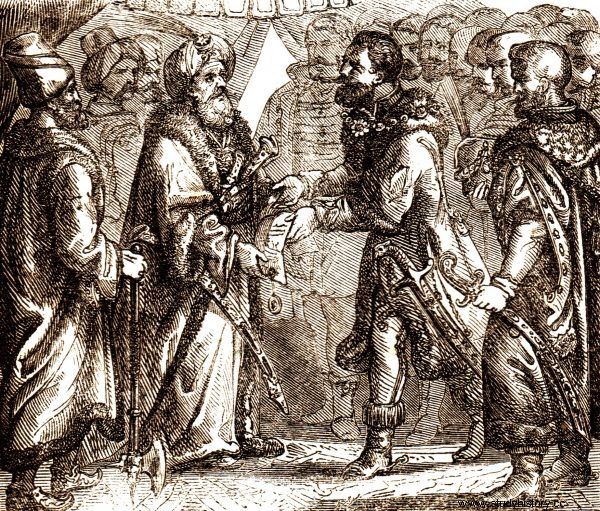
After Izabela Jagiellonka returned to Transylvania, Stefan Batory became a faithful supporter of her son, Jan Zygmunt Zapolya. He did not expect that in the future he would succeed Zapolya in Transylvania, and then marry his aunt ... 19th-century engraving by Fényes Elek, depicting the meeting of John Sigismund with Sultan Suleiman II the Magnificent in 1566.
The Szatmar Fortress was given to a certain Balassy after Batory. He soon handed it over to the Habsburgs. However, the future king of Poland did not ignore him. He took advantage of Balassy's absence from the town to do something important. This is how Jerzy Besala describes the course of events in Batory's biography:
As every evening, on October 3, 1564, the gates of the fortress were opened to let in cattle from the yellowing pastures. Imagine the surprise and then the horror of the small crew of Szatmár when the gloomy mustachioed faces appeared from behind the clouds of dust and cow horns and the hands of the "soldiers of the Virgin Mary" raised to cut sabers. They did not spare anyone except the immediate family of Balassa, which Batory sent back to Jan Zygmunt.
A year at the inn
The future king of Poland also performed diplomatic functions. His excellent knowledge of Latin helped him in this. From time to time he sent to Vienna to negotiate with the Emperor and King of Bohemia and Hungary in one person - Maximilian II. Not all of his visits were successful. He had particularly bad memories of the one he submitted in 1565. One day in June, the inn where he was staying was surrounded by royal footmen. No consideration was given to the parliamentary immunity, Batory could not leave the inn .
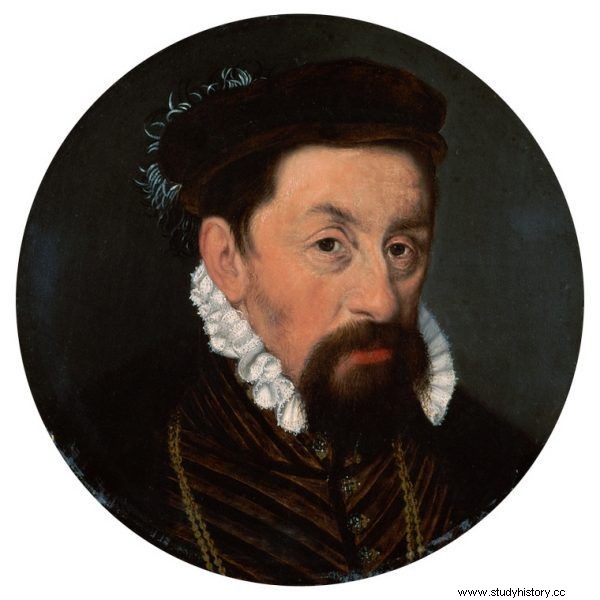
Emperor Maximilian II locked Stefan in ... an inn for over a year. Batory was supposed to bite him a few years later by cleaning the Polish crown from under his nose.
A day, two, a week, a month passed, and the poor man was still locked up in the inn. He killed boredom by reading. He was only allowed for short walks in December 1566, i.e. after several months. In the meantime, his quarters were changed to warmer and more comfortable. He did not regain his freedom until July 1567. After more than two years!
Ruler of Transylvania
In 1571, Jan Zygmunt Zapolya died. Stefan Batory was one of the two magnates who competed for his inheritance. His opponent was Kasper Bekiesz. He asked for confirmation of the nomination to Emperor Maximilian. Meanwhile, our future king appealed to the Turkish Sultan. When some time later an edict sewn in velvet came from Istanbul, rumors said that the name of Batory was there.
Unexpectedly, the interested party himself appealed not to break the seal. He proposed to organize elections, a kind of free election. He rightly argued that breaking the seal and reading the edict would mean that it was the Sultan who decided the person of the new prince of Transylvania.
The proud nobles accepted his arguments. Despite this, however, they feared the sultan, which is why on May 25, 1571, they chose the then 38-year-old Stefan as prince. His artistry must be appreciated:he won the support of Istanbul and at the same time did not become a Turkish puppet.
Cutting ears and noses
The first task of the newly elected prince of Transylvania was ... to deal with his rival. Bekiesz did not give up so easily and the matter had to be resolved in battle. He described its course in the book "Uncomfortable Relationships. A Tale of the End of the Jagiellonian Dynasty ”Jerzy Besala:
On July 10, 1575, Batory, in the victorious battle of Kerellöszentpál (Szentpal, Castellum Sancta Pauli) on the Maros River, crushed the troops of the Habsburg Emperor's ally, Kasper Bekiesz. On the battlefield he had six captured commanders beheaded and the rest of the soldiers had their noses or ears cut off .
Despite his cruelty, Batory first showed civil courage, challenging Bekesh to a duel to avoid spilling Christian blood. Bekiesz will later become a friend of King Stefan .
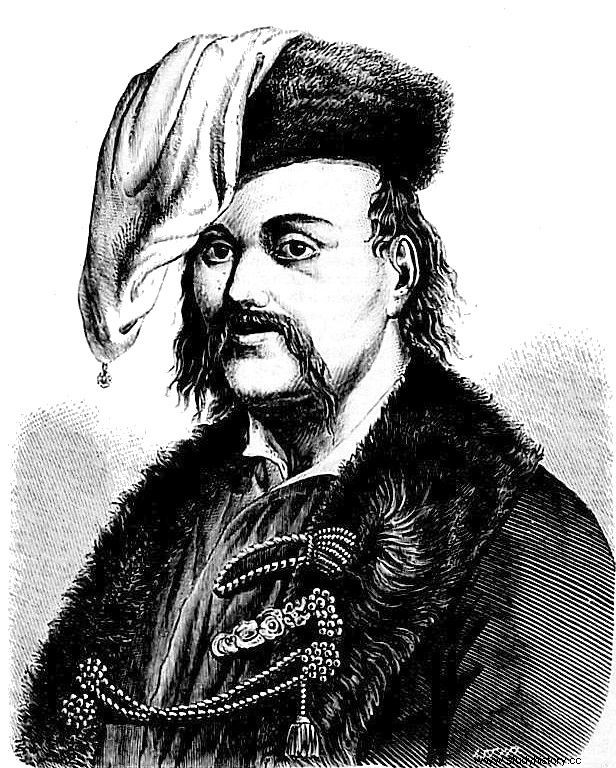
Bekiesz first fought with Batory for power in Transylvania, and then became a faithful associate of Stefan.
The clash at Kerellöszentpál was indeed, to put it in a phrase from "Casablanca", the beginning of a beautiful friendship. When a few months later Batory became the king of Poland, he dragged the former enemy to the Polish-Lithuanian Commonwealth. Bekiesz showed bravery fighting for his new homeland. The king, on his part, generously repaid him by offering him the "Pod Baranami" tenement house in Krakow.
No matter who your parents were, no matter who you are
However, before reconciliation between the rivals could take place, the Polish throne suddenly emptied. After Henry of Valois escaped, the nobility wondered who should become the new king. Paradoxically, she already had a queen. It was Anna Jagiellonka, sister of Sigismund II Augustus, the last representative of the Jagiellonian dynasty. It was she who ensured the continuity of the dynasty, so pretenders to the throne were not buried in family trees. They were simply looking for the best candidate. As Besala notes in the book "Uncomfortable relationships. A story about the end of the Jagiellonian dynasty ” :
The continuity of the Jagiellonian dynasty was to be guaranteed by Anna, as long as Batory marries her. Hence the surprising lack of importance to the origin of Batory (...). The republican nobility did not mind the lack of Stefan Batory's dynastic parallels: he was supposed to be just the husband of Queen Anne .
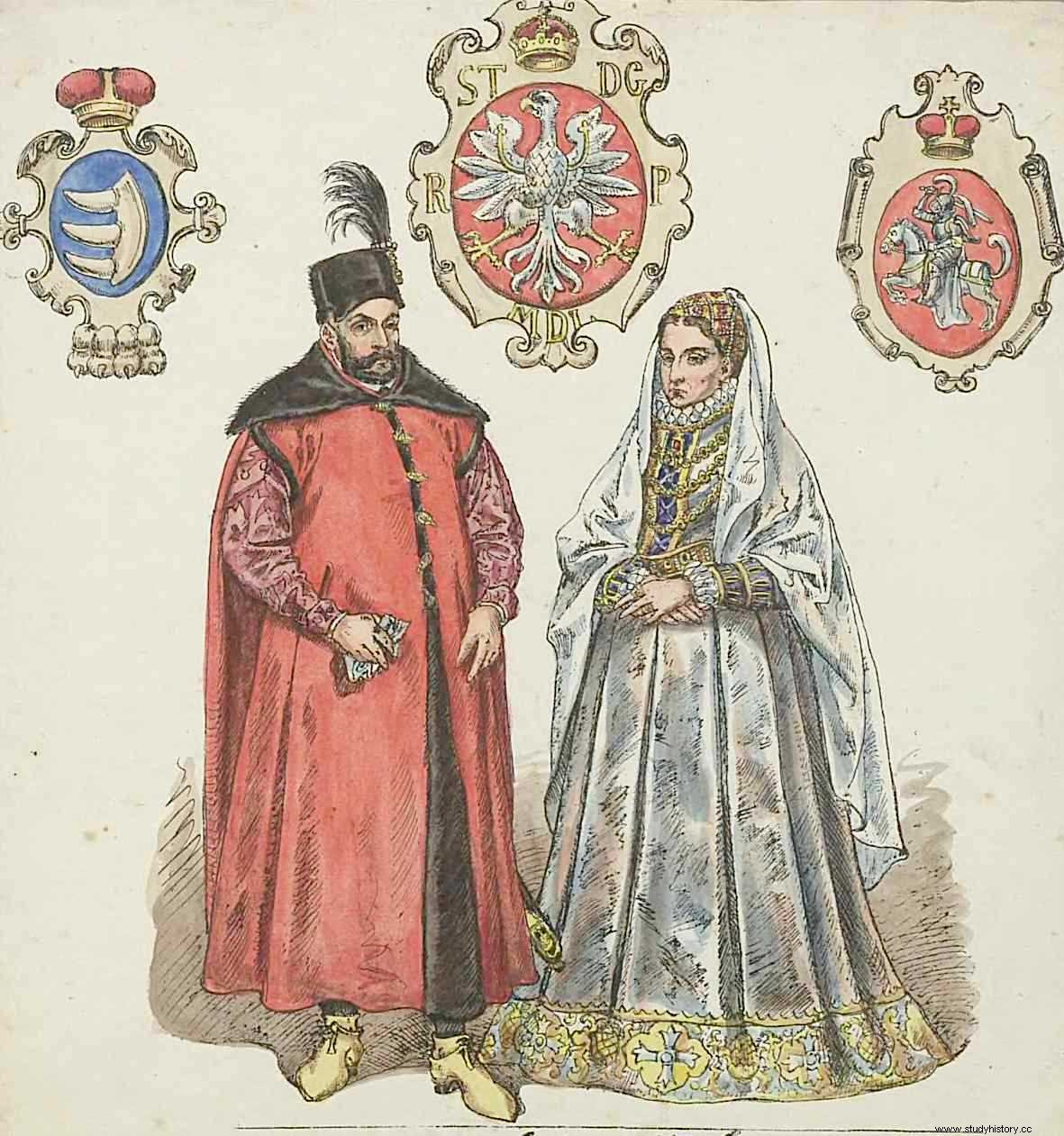
Polish electors could afford to choose a man who did not have a drop of royal blood in his veins. His power was sufficiently legitimized by his wedding with Anna Jagiellonka, the last of the dynasty. The image of the royal couple according to Jan Matejko.
Therefore, his earlier actions worked in favor of 42-year-old Batory. Everything seemed to speak for his candidacy. His military successes were appreciated as he was "expert in knightly matters". Diplomatic talents were admired, emphasizing that he was "learned, wise". Perhaps even his nationality was not without significance. After all, Poland already had two personal unions with Hungary, in the years 1370–1382 and 1440–1444.
The election was not unanimous. In 1575, some voters elected Emperor Maximilian II as the ruler of the Polish-Lithuanian Commonwealth. The same one who imprisoned Batory in a Viennese inn! A year later, sitting on the Polish throne, the Transylvanian prince, in his own way, repaid for several months of imprisonment.
